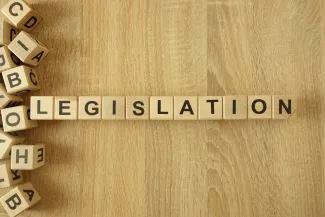
Bill that would ease union formation earns final Colorado Senate approval
© fotoguy22 - iStock - 1468912821
The Colorado Senate gave final approval to a bill Tuesday that would make it easier to form unions in Colorado, following hours of arguments in opposition from Republicans last week.
Senate Bill 25-5 would eliminate a second election mandated by Colorado’s Labor Peace Act to form a union, a requirement that is unique to Colorado. Federal law allows employees to unionize with a simple majority vote, but they must participate in a second vote with 75 percent approval to determine if workers who don’t support the union have to pay representation fees.
The Colorado Labor Peace Act passed in the 1940s, and bill sponsors referred to the provision requiring a second vote as “a relic of the past.”
“Colorado has made significant progress since then, but returning to the policies of 1943 or allowing their legacy to persist would undermine decades of progress and hinder the state’s future,” Senate Majority Leader Robert Rodriguez, a Denver Democrat who sponsored the bill, said on the Senate floor last Thursday, when the chamber first took up the bill for debate.

Senators voted 22-12 along party lines to approve the bill, with Republicans in opposition. Several Republican senators spoke against the bill again ahead of its final approval in the chamber Tuesday.
Republicans argued the bill violates a worker’s autonomy by making them pay union fees and dues even if they don’t support or want to be part of the union. They also said it will make starting a business in Colorado less achievable. Several Republican senators offered amendments that all failed on the floor last week.
“The relaxation of labor organizing standards will certainly deter the vitality of existing Colorado businesses, while also deterring future economic investment within the state,” Senator Barbara Kirkmeyer, a Brighton Republican, said Tuesday ahead of the Senate’s final vote.
Senate Minority Leader Paul Lundeen, a Monument Republican, said Thursday the second vote requirement puts Colorado in a “sweet spot” between right to work states and union states. He described the bill as “a wage theft bill.”
“At the end of the day, this bill seeks to get rid of an election that requires a 75 percent threshold to impose extraction of a portion of an individual’s paycheck, who does not want to participate in the organization that would represent them,” Lundeen said. “But they pay for it anyway.”
Senator Jessie Danielson, a Jefferson County Democrat who also sponsored the bill, said the second vote “has been referenced as this great, grand compromise” but is working for employers and corporations, not workers.
“The working people of the state of Colorado, as well as the folks all across this country, are demanding that we do better for them, do right for the workers,” Danielson said. “We all know that when workers are protected by a union contract, it results in better pay, better benefits and safety on the job. We need to do what we can do to make joining a union easier when the barrier from a worker to this union protection is the heavy hand of the government standing in their way.”
Danielson added that a requirement for a second election leaves workers subject to extended “harassment and intimidation, retaliation, surveillance and possible firings” from the employer. She said the second vote only exists to prevent workers from unionizing.
The Senate Health Business, Labor and Technology Committee approved the bill along party lines in January.
A November study from the Colorado Fiscal Institute found that of the 553 unions that initiated a second election between 1977 and 2024, 68 percent were successful. In 126 of the cases, the second election had a majority affirmative vote but fell short of the three-fourths requirement.
The bill is staunchly opposed by business groups such as the Colorado Chamber of Commerce and Colorado Concern, which argue that the bill would erode Colorado’s economic competitiveness and make it less attractive for businesses to remain in the state. Democratic Governor Jared Polis has suggested that he will not support the legislation unless a compromise arises.
The Colorado House of Representatives, which also has a strong Democratic majority, will need to approve the bill next.
Five former U.S. Secretaries of Labor wrote to Polis in support of the bill last week, saying the requirement for a second vote creates unnecessary barriers to unionization.
“In states without such restrictive laws, after a single successful election, details such as union dues and representation fees are then negotiated and approved in good faith by both workers and employers — a model of fairness that Colorado should embrace,” the letter says.
Colorado Newsline is part of States Newsroom, a nonprofit news network supported by grants and a coalition of donors as a 501c(3) public charity. Colorado Newsline maintains editorial independence. Contact Editor Quentin Young for questions: info@coloradonewsline.com.

















